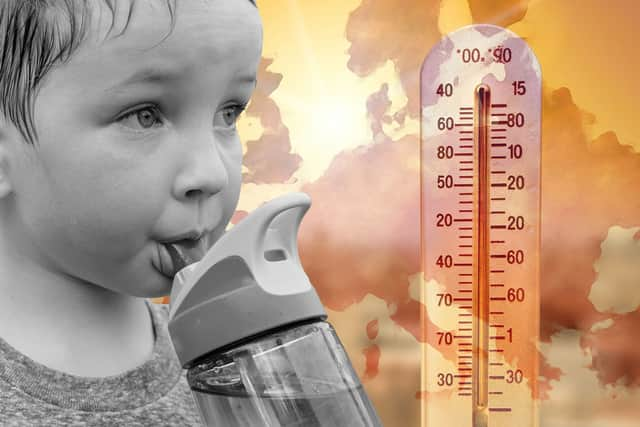Europe heatwave: should I cancel my holiday, will I get a refund - how long will the extreme hot weather last?
and live on Freeview channel 276
Scorching temperatures have swept across popular holiday destinations in Europe causing UK holidaymakers to race to cancel or postpone their summer getaways.
Twenty red warning alerts have been issued today (Tuesday 18 July) out of 27 cities in Italy as the country braces for its highest-ever temperature.
Advertisement
Hide AdAdvertisement
Hide AdSardinia and Sicily have been forecast to reach 48C and meteorologists have predicted that temperatures this week may surpass Europe’s current record of 48.8C set in Sicily in August 2021.
Holidaymakers were evacuated from at least six seaside communities in Greece as their homes were threatened while temperature records are breaking worldwide as both the US and China saw the mercury surpassing 50C on Sunday (16 July).
The British government has issued a warning on its travel advice page to those holidaying in Spain as temperatures could soar to 45C in some parts of the country.
Now many are getting cold feet over whether to cancel their holidays due to the extreme heat - but should you cancel your holiday due to the heat, will you get a refund and how long is the hot weather set to last?


Should you cancel your European holiday due to the heat?
Advertisement
Hide AdAdvertisement
Hide AdA spokesperson from the Association of British Travel Agents (ABTA) told NationalWorld the firm advises holidaymakers not to cancel their getaway as “high temperatures around our favourite holiday hotspots are not uncommon at this time of year”.
The spokesperson said holidaymakers should “take sensible precautions particularly making sure that you and your family drink plenty of bottled water as it is extremely easy to become dehydrated, and always use plenty of high factor sun cream.”
They added that holidaymakers should “follow the example of local people and leave the beach at midday and early afternoon when the sun is at its most powerful” and “cool off in the pool or sea”.
Will I get a refund?
An ABTA spokesperson told NationalWorld normal booking conditions would apply during this time, and so holidaymakers will not get their money back if they cancel their holiday due to the heat.
Advertisement
Hide AdAdvertisement
Hide AdNormal booking conditions mean holidaymakers will not get their money back from airlines as they are not liable for compensation if a trip is cancelled due to factors beyond their control.
Speaking on Good Morning Britain this morning (Tuesday 18 July), travel expert Simon Calder said: “If you decide, because of pre-existing medical conditions or maybe you are travelling with young people or you are an older traveller and don’t want to go, I am afraid the holidays companies say normal terms and conditions apply and you will not be able to cancel without penalty.”
Louise Clarke, policy adviser, general insurance for the Association of British Insurers told iNews that travel insurance is “mainly in place to cover the costs of emergency medical treatments” and can cover customers if they need to cancel or cut a holiday short but “this will likely only be under limited circumstances for example, if you or a close family member fall ill – and not because of a disinclination to travel.”
She added that insurance would be able to cover customers if “advice from the government changes since you’ve booked your trip and it’s no longer considered safe to travel to the destination.”
How long is the European heatwave set to last?
Advertisement
Hide AdAdvertisement
Hide AdThe extreme weather facing Europe is partly due to the Charon anticyclone which hit on Sunday (16 July) from north Africa. It is the second ‘heat storm’ in a week after the Cerberus weather system.
The anticyclone is further intensifying the extreme weather on the continent and it is forecast to hit the Mediterranean until around the end of July.
Ele Hands, Met Office Deputy Chief Meteorologist, said heatwave conditions are expected to “persist and slowly intensify as the focus gradually transfers eastwards towards southeast Europe through this week.”
She added that the high temperatures are being “driven by continued settled conditions under an upper ridge that is sat across the region allowing temperatures to build day by day” and “unusually high sea surface temperatures” as high as 25 to 28C is “exacerbating the effects of the heat over surrounding land areas”.
Advertisement
Hide AdAdvertisement
Hide AdThe World Meteorological Organisation posted on Twitter that the heatwave “will grip the Mediterranean region over the next two weeks with temperatures above 35 to 40C”.
The UN agency warned that there is a 90% probability of the weather phenomenon El Niño continuing until the end of the year at a moderate strength or higher.
The global weather phenomenon happens when waters in the Pacific Ocean become much warmer than usual - and it could push the world past a new average temperature record.
According to the Met Office, a typical El Niño can temporarily add around 0.2C to average global temperature causing more extreme heatwaves.
Comment Guidelines
National World encourages reader discussion on our stories. User feedback, insights and back-and-forth exchanges add a rich layer of context to reporting. Please review our Community Guidelines before commenting.
